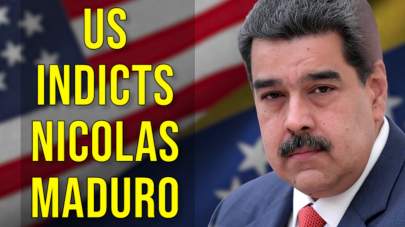Venezuela - Narco State
Wednesday, February 21, 2024
Written by Laurence F Sanford, Senior Analyst ASCF
Categories: National Preparedness ASCF Articles
February 12th, 2024 - by ASCF Sr. Analyst Laurence Sanford

Venezuela is a Narco State. Over 15% of the world's supply of opium is funneled through the country.
“Operation Money Badger” was initiated in 2013 by the U.S. Drug Enforcement Agency (DEA) to record and build drug-trafficking cases against Venezuela’s leadership, including President Maduro. Colombian drug traffickers were utilizing Venezuela’s tightly controlled foreign currency system to launder drug money from sales in the U.S.
In March 2020, the U.S. government indicted President Nicholas Maduro of conspiring “to flood the United States with cocaine” and use it as a “weapon against America.” Secretary of State Mike Pompeo offered a $15 million reward for information leading to the arrest of Maduro. Other U.S. officials accused Maduro of harboring drug traffickers, guerrillas from Columbia, and the terrorist group Hezbollah. Russia, China, Iran, and assorted Islamic terrorist groups support the Venezuelan government.
U.S. Ambassador to the U.N., Nikki Haley, in 2018 called for Maduro to step down from ruling the narco-state. The Trump administration instituted wide-ranging sanctions and also called on the Organization of American States (OAS) to suspend Venezuela for its lack of election transparency, totalitarian rule, and migration of millions of Venezuelans to other countries, including the U.S. Millions of Venezuelans are suffering from food and medical shortages. Haley compared Venezuela to the failed states of Cuba and Nicaragua.
Yet Maduro is now thriving in Venezuela. The Biden administration lifted oil sanctions, arranged a prisoner swap, and eased prosecutions of Maduro’s inner circle. Columbia has a new leftist president, Gustavo Petro, a former urban guerilla, who has promised to transform Colombia's economic system. He and Maduro have a cordial relationship.
Maduro is a Marxist thug. His totalitarian socialist policies of government control resulted in the following:
● Poverty despite having the world’s largest oil reserves.
● Freedom of assembly and speech are stifled due to police technologies aided, abetted, and supported by Cuba, China, and Russia.
● The social fabric is sundered with mass incarceration and migrations.
And like other Marxist thugs who do not honor existing treaties and territorial claims, such as Putin in the Ukraine, Xi in the South China Seas/Taiwan, and Kim in North Korea, Maduro is claiming two-thirds of neighboring Guyana belongs to Venezuela. The territorial dispute was ongoing for most of the 1800s but was settled with an 1899 treaty). Venezuela recently re-opened the disagreement with the discovery of massive oil deposits off the Guyana coast. A phony referendum in Venezuela claimed the disputed area of Essequibo, which represents two-thirds of Guyana. Maduro gave an ultimatum of three months for oil companies (American) to stop drilling in the disputed waters.
Now, Venezuela is threatening military action. Troops, tanks, and missile-equipped missile patrol boats are massing near the Guyana border. Maduro has ordered state-owned oil companies to drill for oil in the waters off Guyana. ExxonMobil Guyana plans to expand operations in the same waters that Venezuela claims, but by treaty is located in Guyana territory. Previous attempts by ExxonMobil to drill in the disputed waters failed because of Venezuelan military actions. Now, the ExxonMobil president said the Guyana government granted the oil concessions and that it is committed to its operations.
The British sent a warship to the Guyana coast, and the U.S. promised to supply modern military equipment. It announced the commencement of joint military drills. Brazil’s President Luiz Inácio Lula da Silva voiced concerns over the border dispute and is reinforcing its military presence in the border area.
Summary
America’s dominance of the world is over. Rising threats from China, Russia, Iran, North Korea, and Islamic terror groups have diffused power throughout the world. Technologies allow minor league players to assert world threats. Internet viruses, biological viruses, supply chain disruptions, food availability, and political/religious strife can fundamentally transform the world order.
The Monroe Doctrine, where the U.S. calls the shots in the Western Hemisphere, is long gone.
Our leaders must tend to our own garden to protect America and make America the bastion or Shining City on the Hill of freedom and prosperity. Instead of the DEA running amok in Latin America, the DEA should be enforcing drug laws within the U.S. No one is forcing Americans to buy and ingest cocaine or fentanyl.
Sanctions do not work. Sanctions generate anti-American sentiment throughout the world. One of the reasons for BRICS's growing influence is that it offers an alternative to U.S. sanctions.
“Speak softly and carry a big stick” was the diplomacy of President Teddy Roosevelt. It was the exercise of intelligent forethought and decisive action sufficiently far in advance of any likely crisis.”
For more information on Venezuela, see https://www.ascf.us/news/war-in-latin-america-/
Action
- Elect leaders who support rebuilding and investing in the U.S. military and its industrial base.
- Enforce drug laws and deal harshly with drug dealers.
- Enforce immigration and border laws to stop the flow of drugs and illegal aliens into the country.
- Support international law and order on the Guyana border.
- Increase “Gray Zone” cyber, social media, and propaganda efforts defending American Civilization against Marxist totalitarianism.
- Eliminate funding to NGOs and UNRWA that do not support American values.
Peace Through Strength!











